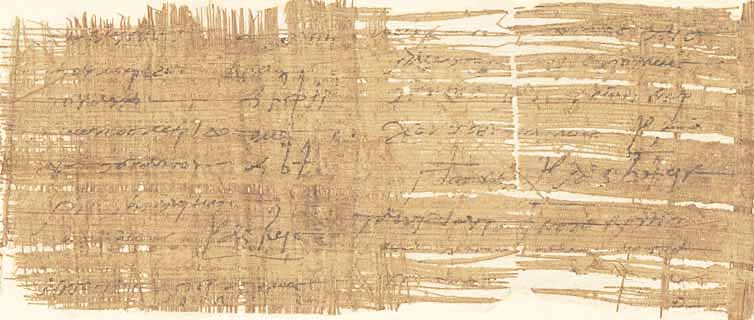Outstanding texts from the Berlin Papyrus Collection
The Berlin collection holds numerous texts of historical and philological importance. Some of them even acquired publicity beyond the community of papyrologists and ancient historians.
The Persians by Timotheos of Miletus (P. 9875)
The oldest papyrus roll known dates to the 4th c. BCE and contains parts of the work Persians written by Timotheos of Miletus. Extant are inter alia a description of the battle of Salamis (480 BCE) as well as a speech by the Persian king of kings Xerxes. Go to record
The marriage contract P.Eleph. 1 (P. 13500)
This marriage contract constitutes the oldest known text written in ancient Greek dated to a precise year. The contract was concluded by Herakleides and Demetria, both stemming from the island of Kos. The papyrus is dated 310 BCE, which is the sixth regnal year of Alexander IV Aigos, son of Alexander the Great and Roxane, as well as the 14th year of the diadoch Ptolemaios I. Soter. It was set up in the form of a double-document signed by six witnesses. Go to record
The “Drinking Songs” from Elephantine (P. 13270)
Copy of a song book dated to the early 3rd c. BCE. It may well have been used during symposia. Go to record
Menander, Kitharistes (?) (P. 9767)
Most of the comedies of Menander (342/41 – 291/90 BCE) are known to us only via bits and pieces on papyri from Egypt. By way of example for the more than fifteen fragments owned by the Berlin collection P.9767, written sometime during the 2nd or 1st c. BCE, presumably contains parts of such a comedy, namely the Kitharistes (“Cithara Player”). Go to record
Royal decree of Kleopatra VII Philopator (P. 25239)
This decree was issued by Kleopata VII Philopator and addressed to her son Ptolemaios Caesar (Kaisarion). It grants trade privileges and tax immunities to a roman businessman. The text became famous because some historians believe that the notice of receipt was written by Kleopatra herself. Go to record
Speeches of the emperor Claudius (P. 8507 R)
The papyrus roll contains copies of two speeches of the emperor Claudius, given during his reign (41 – 54 CE) in front of the senate in Rome. The speeches treat the question of the minimum age of potential judges and the prevention of wanton delays instigated by certain prosecutors. Go to record
Gnomon of the Idios Logos (P. 11650 V)
The Gnomon was written sometime in the 2nd c. CE and contains extracts from a handbook intended to facilitate the work of the Idios Logos, who was a high ranking Roman official. 121 of the paragraphs are extant. They deal mainly with questions of taxation, law and cults. The Gnomon allows a very close view of the daily administrative routine in Egypt. Go to record
A codex of wax-tablets with scholia minora in Homerum (P.10508 ff.)
Scholia minora in Homerum, especially concerning books 11, 13, 14 and 15 of the Iliad, written on several wax-tablets dated to the 2nd c. CE, which combined take the form of a codex. The wax-tablets also include grammatical treatises. Go to record
Cicero, Pro Cn. Plancio (P.13229 A + B)
Written on parchment during the 5th c. CE, this text contains parts of the forensic speech held by M. Tullius Cicero (106 – 43 BCE) in defence of Cn. Plancius in 54 BCE. Plancius was accused of bribery and fraud (ambitus) by his political enemies in the context of his election as one of the aediles. Go to record


